The role of the microbiome in preventing colon cancer has been explored by a team of researchers at the University of Pittsburg School of Medicine. The researchers have identified a bacterium that is commonly found in the mouse gut microbiome which appears to help the immune system fight colon cancer cells.
The standard method of altering the microbiome is through fecal transplants, where fecal matter is obtained from a healthy individual and is introduced into the gut of a person suffering from a disease or medical condition. While this approach has been effective in some patients, it is a bit hit and miss and there are no guarantees that beneficial microbes will thrive and the correct microbial composition will be achieved.
The researchers explain in their paper that the composition of the intestinal microbiota is associated with the development of tumors and the efficacy of anti-tumor immunity. In their study, they examined the effect of microbiota-specific T cells in anti-colorectal cancer (CRC) immunity. The researchers found that the introduction of Helicobacter hepaticus (Hhep) in a mouse model of CRC did not affect the microbial landscape but did increase tumor infiltration by cytotoxic lymphocytes and inhibited tumor growth.
“Ignoring the influence of gut bacteria on the success of cancer therapies seems like a massive oversight,” said Abigail Overacre-Delgoffe, PhD, a postdoctoral fellow in UPitt’s department of pediatrics and lead author of the study. “We need to think about all the things that patients go through day to day that can cause treatments to succeed or fail. We can’t ignore the bacteria anymore—they influence everything.”
Their findings could potentially lead to a new class of drugs based on the molecules produced by beneficial bacteria in the gut that could be used for treating a wide range of diseases and health conditions.
You can read more about the study in the paper – Microbiota-specific T follicular helper cells drive tertiary lymphoid structures and anti-tumor immunity against colorectal cancer – which was recently published in Immunity. DOI: 10.1016/j.immuni.2021.11.003
